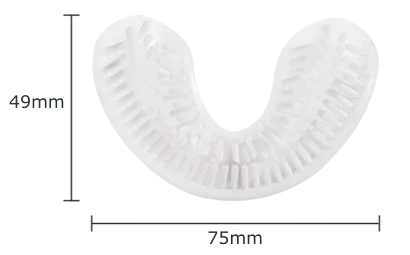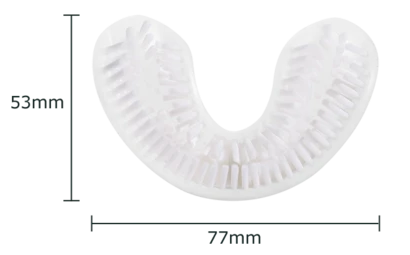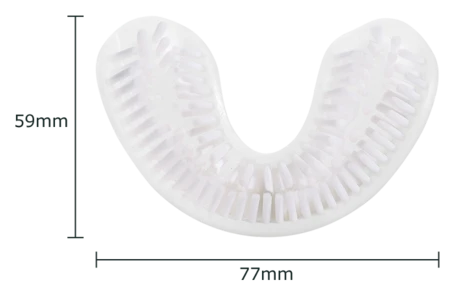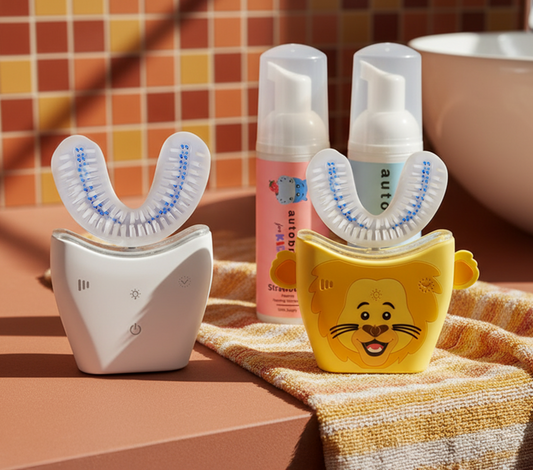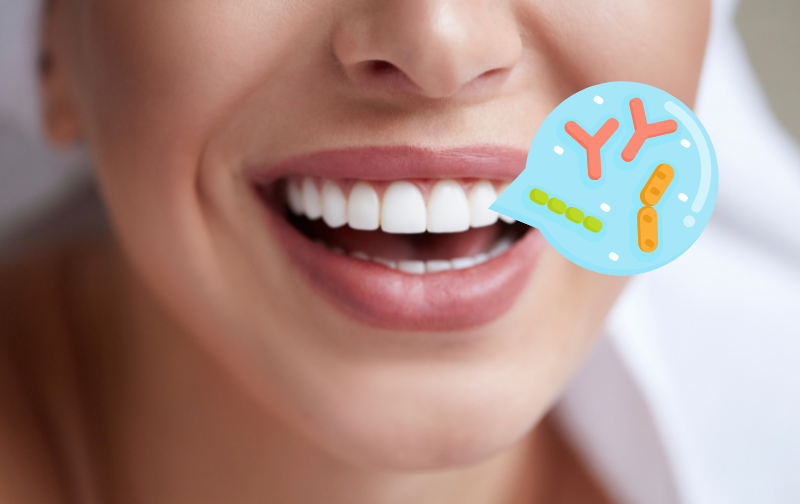
Oral Probiotics: The Benefits, Risks & Best Strains
It's no secret that taking probiotics - a type of bacteria found in the gut and other areas of the body - can improve your overall health. But did you know they can also help improve your teeth and gums?
Oral probiotics are specifically designed to help improve the balance of bacteria in your mouth. They can be especially helpful for people with poor oral hygiene including those that struggle with chronic bad breath, cavity prone teeth, and gum disease.
In this blog post, we will discuss the benefits of oral probiotics and what strains are best for your mouth.
What Are Oral Probiotics?
Oral probiotics, also referred to as dental probiotics, are live microorganisms that help improve the balance of bacteria in your mouth by restoring the good bacteria that is lost due to poor oral hygiene.
They are available in different formulations including tablets, lozenges, chewing gums, powders, and liquids.
Do dental probiotics really work?
Yes! Many dentists and other oral health experts recommend using dental probiotics to help patients with following:
- Reducing plaque and gingivitis
- Fighting bad breath
- Preventing cavities
- Strengthening the teeth and gums

How Do Oral Probiotics Compare to Gut Probiotics?
Oral probiotics are similar to gut probiotics. They are live microorganisms designed to help improve the balance of bacteria in a specific area of the body.
However, there are some critical differences between oral and gut probiotics.
- Formula: Gut probiotics are typically taken in capsule form, whereas many oral probiotics are designed to sit in the mouth.
- Dosage: Gut probiotics are taken in larger doses than oral probiotics. This is because the gut is a much larger area than the mouth, so more probiotics are needed to have an effect.
- Benefits: Oral probiotics address mouth health specifically, while gut probiotics can have a more general effect on overall health.
What Are the Different Strains of Oral Probiotics?

There are many different strains of oral probiotics with varying benefits. Some common strains include:
- Lactobacillus: reduces plaque and gingivitis
- Streptococcus: reduces plaque and gingivitis
- Bifidobacterium: reduces plaque and gingivitis and helps prevent cavities
🦷️ Toothy Tip: It's important to choose an oral probiotic that contains one or more of these strains to get the most benefit for your oral health.
How Long Do Oral Probiotics Take to Work?
It takes about two weeks for oral probiotics to start working. The probiotic needs enough time to colonize in the mouth so most dental health experts recommend consistently using oral probiotics for 1-2 months to see its full benefit.
How Do I Use Oral Probiotics?

Oral probiotics may be ingested once or twice a day. Some probiotics may also need to sit in your mouth for two minutes while others may be swallowed. Since there are several forms of probiotics from tablets to chewing gum, read and follow the instructions carefully.
It is also recommended to eat foods rich in prebiotics - a type of food that helps feed the probiotics and improve their effectiveness - like garlic, artichokes, and apples.
What Are the Benefits of Oral Probiotics?
Since oral probiotics are designed to improve the balance of bacteria in your mouth, they come with a number of benefits for oral health.
Prevents and Reduces Plaque and Gingivitis
Plaque is a sticky film of bacteria that forms on teeth. It is the leading cause of gingivitis - inflammation of the gums. Probiotics have been shown to help reduce plaque formation in the mouth by reducing cavity-causing bacteria.
🦷️ Toothy Tip: A12, a type of streptococcus, is a great prebiotic to implement if you are need extra help fighting off plaque.
Fights Bad Breath
Bad breath, also known as halitosis, is often caused by an imbalance of bacteria in the mouth. Probiotics help fight bad breath by reducing the amount of odor-causing bacteria in the mouth.
🦷️ Toothy Tip: S. salivarius K12 and L. reuteri are two of the most effective strains for fighting bad breath. Compared to mouthwash, these probiotics are more effective at reducing bad breath without harsh side effects.
Reduces the Risk of Oral Thrush
Oral thrush is a fungal infection that commonly affects the mouth and tongue. It is most often seen in infants, the elderly, and people with weakened immune systems. Probiotics reduce the risk of oral thrush by maintaining a healthy balance of bacteria in the mouth when paired with a healthy diet, good oral hygiene, and regular dental checkups.
🦷️ Toothy Tip: Lactobacillus is particularly effective at reducing the risk of oral thrush.
Decrease Symptoms of Tonsillitis
Tonsillitis is a condition that causes inflammation of the tonsils. A viral infection commonly causes it, but a rampant bad bacteria can trigger it.
A recent study found that taking an oral probiotic for 30 days delivers rapid relief from recurrent tonsillitis. The study also found that the microbiome of the upper respiratory tract can be improved after taking probiotics. This suggests that probiotics could have long-term benefits for people who suffer from recurrent tonsillitis.
Risks and Side Effects of Oral Probiotics
Are dental probiotics safe?
Unlike gut probiotics, oral probiotics have little to no risk of side effects. They are designed to live in your mouth and are not absorbed into the bloodstream.
However, as with any supplement, you need to consult your doctor before taking oral probiotics especially if you are pregnant, breastfeeding, or have any underlying medical conditions.
How Do I Choose an Oral Probiotic?
When choosing an oral probiotic, look for the following:
- Ingredients that contain live and active cultures. This will ensure that the probiotic is effective.
- A high count of CFUs. CFUs are colony-forming units and measure the number of live bacteria in a probiotic. The higher the number of CFUs, the more effective the probiotic will be. A great oral probiotic can have up to three million CFUs.
- The most effective strains. Choose a probiotic that contains S. salivarius K12, L. reuteri, and/or lactobacillus.
What Foods Can I Eat To Increase My Probiotic Intake?

In addition to implementing oral probiotics into your routine, be sure to include probiotic-rich foods into your diet. Probiotic foods contain live bacteria that work to promote good gut health and prevent infection.
Some common probiotic foods include:
- Greek yogurt
- Kefir
- Sauerkraut
- Kimchi
- Miso soup
These nutrient-rich foods boost immunity, regulate digestion, and support overall well-being.
Final Thoughts
We all know how important it is to take care of our teeth and gums. So it can be incredibly frustrating when no matter how much you brush and floss, you still find yourself struggling with cavities or gum disease. That's where oral probiotics lend a helping hand.
Oral probiotics are a safe, effective way to improve your oral health. They work by replenishing the good bacteria in your mouth, which helps to keep your mouth healthy and free from infection. They also can be your partner in crime at reducing plaque buildup, reducing bad breath, and helping to prevent tooth decay.
My advice? If you're looking for a natural way to improve your oral health, oral probiotics are definitely worth trying.
What to Read Next...
What is the Difference: Hydroxyapatite vs. Fluoride Toothpaste








